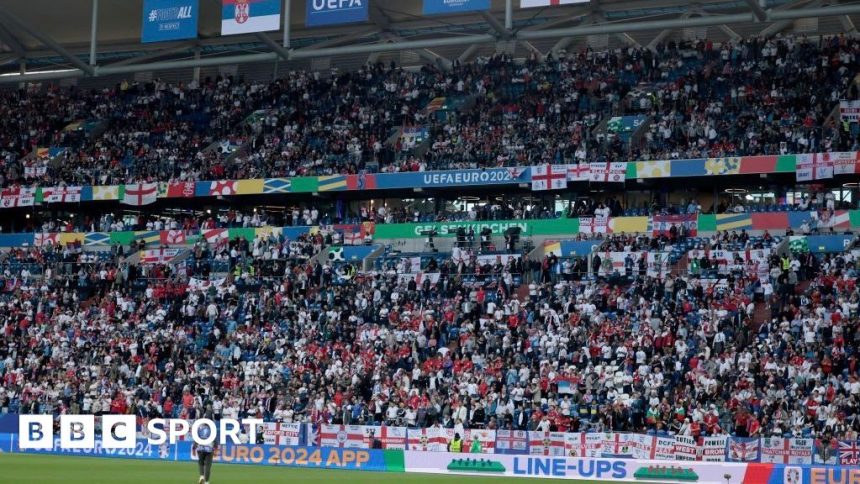England fans’ behaviour under scrutiny over chant
Reaction to controversial chanting referencing World War Two at Euro 2024.
-
Published
The behaviour of some England fans at Euro 2024 is under scrutiny after a number were filmed singing a controversial chant referencing German casualties in World War Two over the weekend.
So why does it still happen, will it continue to be sung and what can be done?
Despite an appeal by both British and German police for fans to refrain from doing so, BBC Sport witnessed the ’10 German bombers’ chant being sung in the German city Gelsenkirchen on the day of England’s opening match against Serbia on Sunday.
Then on Wednesday afternoon, BBC Sport filmed some England fans directing those chants at a group of passing Germany supporters in the centre of Frankfurt.
Over the last few days, we have asked some supporters how they felt about it.
“Just don’t do it,” said one. “There are so many more chants to have rather than that one. [The war] was, what, 80 years ago?!”
“It’s just unsavoury and unnecessary,” said another. “It’s one of those things that when we’re trying to be friends with the Germans, and they’re trying to be good hosts, it just doesn’t give off the greatest impression.”
Others however, seemed unconcerned by the song, perhaps helping to explain why a chant that the vast majority of supporters seem to find embarrassing, distasteful, and inappropriate, continues to be sung.
“Is it anti-German?” said one when asked it. “There’s no swearing, there’s no offence intended. It’s just an England song. It has been for a while. It’s part of the history.”
Another added: “People are looking for something to be offended by these days. It’s not like there’s any swear words. I don’t think it’s an issue.”
Others seemed to know very little if anything about the subject or conflict they were singing about and some made the point that England are not the only nation with fans who sing offensive chants designed to goad the opposition.
Could fans be prosecuted or fined over chant?
Last month, British authorities suggested that perpetrators could be hit with fines in Germany if they refused, when asked, to stop singing such songs, and if deemed sufficiently provocative, to qualify as a possible public order offence.
However, German police have also said there is a limit to what they can do because singing the song is not a criminal offence in the country, unlike Nazi-related gestures or the chanting of discriminatory racist or homophobic songs.
The practicalities of stepping in when hundreds of fans may be singing such a song also has to be taken into account.
“It depends on the circumstances. First they can expect communication, [and asked] ‘what are you doing?’” said Oliver Strudthoff, the head of Germany’s National Police Co-ordination Centre, when I asked him last month how such behaviour would be handled during the Euros.
“It’s perhaps not an offence, but it’s very, very impolite. So please stop this,” he said, suggesting a fine or even arrest could follow if the behaviour became more serious.
A spokesperson from the UK Football Policing Unit said: “The vast majority of supporters travelling will be genuine fans who simply want to enjoy the football. We would urge any fans travelling to be mindful and aware of the local culture and be good guests.
“Wilfully acting in a way to cause offence could result in a heightened risk to your personal safety, and German police will take action against those breaking the law. This action can include heavy fines and custodial sentences.”
“I just think it’s pretty dull and boring” chief constable Mark Roberts, the national lead for football policing, told BBC Sport.
“The Germans are fairly even handed about it. There is a limit, though. As with public order legislation in this country, we see a lot of controversy about things that people say. Is it an offence? Is it not? We can’t give black and white rules on it. It is context specific.
“We saw in Munich the last time England played there. The Germans were tolerant to a point. But when people overstepped the mark, they were arrested and dealt with.”
So could the FA do more?
Back in 2017, the Football Association (FA) appealed to fans to stop singing the chant, threatening them with bans if they persisted. Manager Gareth Southgate called the behaviour “completely unacceptable”.
There were even calls for English football’s governing body to be punished by Uefa for what some campaigners described as an ‘ultra-nationalist’ and potentially discriminatory song, if they failed to stamp it out.
Perhaps mindful of not wanting to draw attention to the chant in case it encourages even more to do it, the FA has not directly addressed the controversy at the weekend, instead emphasising that it expects fans to support the team “in the right way”.
Officials are hopeful that the risk of being filmed singing the chant with footage then being posted on social media, with the embarrassment that could cause, acts as a deterrent to those tempted to do it.
The FA has information about a proportion of the England fans through its official supporters club, so could seek to ban any of those who sang the chant – if there was sufficient evidence. But many thousands of supporters in Germany are not members, and do not even have tickets, so there is a limit to what the governing body could do in these cases.
The FA is also wary of being seen to lecture fans at a time when it is generally pleased with standards of behaviour, especially considering the transport issues many supporters suffered trying to get to and from the stadium in Gelsenkirchen.
Although the song has been sung by fans for decades, the fact the Euros is being staged in Germany has raised concerns sensitivities over it, along with fears it could provoke violence at the end of a season in which hooliganism surrounding the club game appears to have re-emerged across the continent.
‘Tragedy chanting’ crackdown in English football
Perhaps there is also more awareness of offensive behaviour after a recent crackdown on vile ‘tragedy chanting’ in English football.
Last year the Crown Prosecution Service updated its guidance on football-related offences, making clear that tragedy-related abuse can be prosecuted as a public order offence. This followed the football authorities launching a charter seeking to improve fans’ behaviour after arrests at football matches in 2022 hit their highest levels in years, with worsening fan disorder.
Last year a Spurs fan was given a football banning order and fines for making gestures mocking the Hillsborough tragedy during a match at Anfield. The man admitted a guilty charge of use of threatening and abusive behaviour to cause harassment, alarm and distress.
A Manchester United supporter who wore an offensive shirt about the 1989 disaster at the 2023 FA Cup final also got a four-year ban. In April a fan was charged with causing harassment, alarm or distress over alleged tragedy chanting during a match between Manchester United and Burnley.
The authorities will hope these instances act as a deterrent to those tempted to behave in such a way. In Germany however, as the Euros progresses, it may be that the most effective pressure to stop singing chants about the war ultimately has to come from those England fans who do not want to be associated with it.





